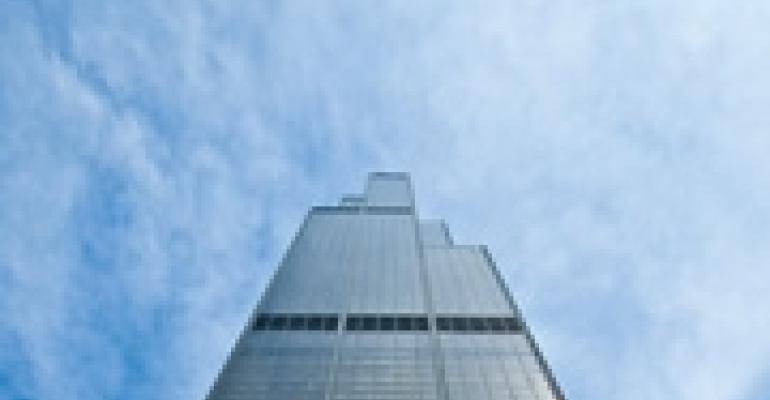
The sudden assumption in the commercial real estate world after the twin towers of the World Trade Center were demolished on 9/11 was that in a new era ruled by fears of urban terrorism iconic skyscrapers would suddenly fall out of fashion. Business at the nation’s highest building, the 110-story Sears Tower in Chicago, began to plummet as tenants retreated to lower office space elsewhere.
Fully nine years have passed, domestic terrorism doesn’t breed the same urgent fears and the Sears, renamed the Willis Tower, is making an impressive comeback. When U.S. Equities Realty took over as the building’s manager in 2008 from CB Richard Ellis, the complex’s 3.4 million sq. ft. in offices were limping along with a 22% vacancy, with most of its ground-floor retail, including a boarded-up Bonwit Teller store, empty and dark.
Today the vacancy has been slashed to 10%, far better than the surrounding office market average of 16%, and negotiations with prospective tenants suggest the building can get to 7% or less vacancy next year. “This is a pretty amazing turnaround considering that most brokers three years ago refused to even show their office clients space here,” says Robert Wislow, chairman and CEO of U.S. Equities.
How did Wislow and his leasing group bring the Willis, owned by a private partnership, back? One thing the firm didn’t do was panic and cut rates. In fact, leases became more expensive, with asking rates rising from $14 to $18 per sq. ft. net under the CBRE regime to $17 to $21 a foot currently. Taxes and expenses add another $17 per sq. ft.
Like a lot of super-tall buildings, by 2007 the Willis had taken on an institutional war zone look, with rows of sterile security greeting visitors in the lobby. U.S. Equities set about humanizing the entryways, moving scanning machines behind columns and down stairways, ordering “friendly training” for the once-morose lobby guards, and adding flowers, trees and other greenery inside and outside.
The lobby played host to a rotating art exhibit, while the top-floor sky deck was recast with a glass ledge jutting out into space and offering jaw-dropping views. Visitors could look straight down 1,300 ft. through the glass floor to the canyons of Chicago’s Loop — inspiring nationwide headlines for its daring concept.
There was more. Management installed the highest “green” roof in the world, 96 floors up, and hosted a farmer’s market in the plaza all summer. Reduced water flow fixtures cut water consumption by 10.5 million gallons annually — the equivalent of 156,000 bathtubs. A tenant program offered loaner bikes, helmets and showers.
Tenants signed on. The Willis Group, a London-based insurance firm, took 140,000 sq. ft. and put its name on the structure. United Airlines, recently merged with Continental, this fall took 650,000 sq. ft. and began moving 1,000 people from the suburbs to a nine-floor block.
“When you’re relocating an organization as big as ours, size is important. The Willis Tower certainly has size,” says Kate Gebo, United’s vice-president of corporate real estate.
The tallest building in the world at 1,451 ft. when it opened in 1973, the Willis is now merely No. 8, far behind the 2,717-ft. Burj Khalifa in Dubai. It’s still the biggest in the U.S., but the 1,776-ft. One World Trade Center opens in three years in Manhattan.
“Nobody cares if the Willis isn’t the tallest building anymore,” says Howard Ecker, a Loop tenant representative for four decades who is steering clients to the Willis of late. “It’s still a great building physically. It’s got unusual features, like underfloor duct systems, that you don’t see in newer buildings these days. People just want to be there now.”

